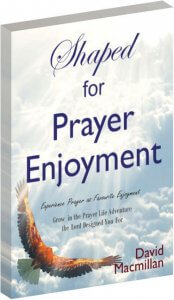Hunger for God will grow if it’s fed. Prayers of contemplation will do that, but it’s definitely not spiritual fast food.
In Psalm 63, David declares his longing for the Lord, and shows or hints at three types of prayer that nurtured his spiritual appetite.
The first two (covered in last month’s post, Stretch our Appetite) are meditation and admiration. This post picks up the third prayer type: contemplation.
What is it?
On my bed I remember you; I think of you through the watches of the night (Ps 63:6).
What does it mean to contemplate the Lord?
Whereas meditation calls to mind a particular truth about the Lord, contemplation involves focussing thought, emotion and spiritual perception on the awareness of his presence.
The word has its roots in the Latin, ‘contemplari’ meaning ‘to gaze attentively, to observe’.
It may include pondering our relationship with the Lord, but not to examine its quality (that’s important, but is a different prayer discipline). Rather, it’s the wonder of being in his company as his beloved bride.
We contemplate God being fully with us in order to practise being fully with him.
Contemplative prayer is silent. We escape from as much outward noise as possible and aim to quieten inner distractions (wandering thoughts or troubled emotions). In that stillness, our desire to know his presence more deeply joins his desire to be known by us (Ps 46:10).
The psalmist found the quiet night hours (the watches of the night) to be a good time for contemplation. But doing it as David did (on my bed) without falling asleep is a challenge. Perhaps the Davidic era beds weren’t as comfortable as ours.
It’s called contemplative prayer, but it’s actually more of a ‘feeder discipline’ for all prayer types.
Contemplating the Lord is not just a mix of desire plus love-discipline. The Holy Spirit is nurturing us in an enjoyable contemplative lifestyle. He grows our awareness of being in God’s presence, and trains our heart’s eyes to ‘gaze’ at him (Eph 1:17-18, Ps 27:4, 2 Cor 3:18).
Setting time for unhurried contemplation of the Lord is important. But so too are the ‘seized’ moments in a busy day, brief pauses to ponder the miracle of being in God’s company.
Staying focussed
Contemplation isn’t a time to mull over needs, difficulties, or plans. Our focus is fully on the Lord-with-us. That means carefully reining in our thoughts.
If a scripture comes to mind while contemplating the Lord, decide whether it carries a truth that can deepen the awareness of God’s presence. If it doesn’t, it’s best to return to it at another time.
If thoughts turn to a personal need, it’s difficult to ignore it. Often, the best response is to let the thought serve your contemplation, rather than distract you from it. Look for a truth or spiritual parallel in that circumstance that can add something significant to your focused contemplation of the Lord. For instance, David’s life was in danger as he sang Psalm 63. The crisis drew his attention to the Lord as Helper (7-8). He was aware of being in the presence of the all-powerful God, his Helper. David saw himself being held by him and resting safely in the shadow of his wings. In a wonderful way, David’s troubling circumstances served his contemplation of the Lord.
Contemplation is probably one of the most difficult types of prayer for us because it requires stillness and spiritual focus in the noisy, distracting arena of life. But, it’s too valuable to leave out. By pondering the Lord, we stretch our appetite for him. We deepen our longing for intimacy with him, enjoy the wonder of living in his company and grow our experience of resting in him.
- Revisit the practical exercise from Psalm 145 in the previous blog. This time, recall a different work of the Lord and meditate on its truth(s) about him.
- Then, once again, move from meditating to admiring that truth about the Lord (prayers of wonder, praise, celebration, thanks, adoration or hunger…or a blend of these).
- Finally, spend time in stillness, contemplating the Lord. Ponder him, the One who is full of the beauty of that truth you meditated on and admired, being fully present with you. Focus on being fully present with him. Allow the contemplation of the Lord-with-you to stretch your appetite for him, deepen your longing for intimacy with him, enjoy the wonder of living in his company and grow your experience of resting in him.




